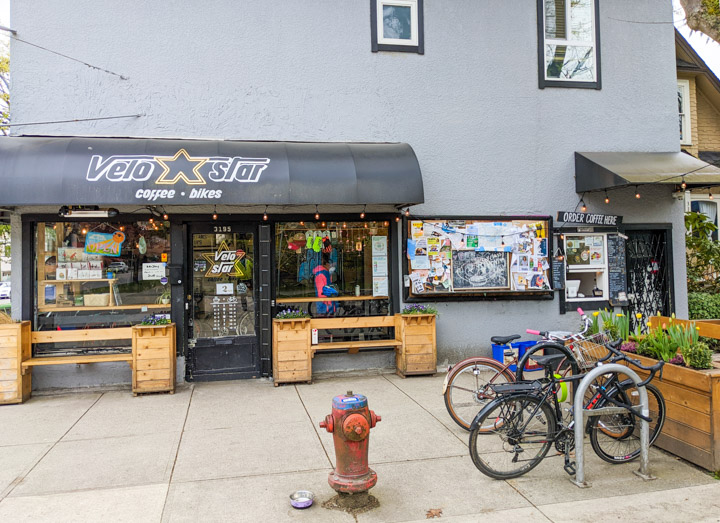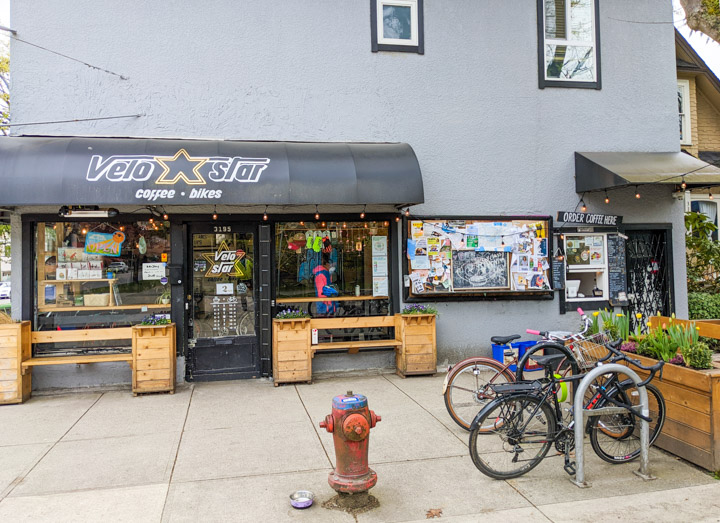
Humanity and its planet are generally not working that well just now, which is depressing. By way of cheerfulness, and maybe education, here are two counter-examples; professional interactions from my own day-to-day life where things go about as well as one could want. And maybe there’s a lesson in that.
Velo Star · What happened was, I had a little fall on my e-bike (by the way, if you haven’t tried one, follow that link and maybe I can help convince you, because you should). No damage to me, but the gearshift was wonky, it’d shift up but down was a struggle, and the whole thing just didn’t feel right. I put “book a bike appointment” on my To-Do, because in a cycle-crazed city like Vancouver you can wait weeks for your bike to get looked at.
Except for, my bike-commute goes by the Velo Star Cafe, which combines coffee and bikes, and on impulse the day after my fall I stopped by there on my way home and told them the problem. It was busy with people having coffee and talking bike service and one guy who was showing off his hot new ride to the staff, who were impressed.
The Velo Star guy came out from behind his counter and looked at it and said “yeah, something’s bent” so I said “Can I make a date to get it fixed up?” and he said “Lemme have a look, might be able to do it right now” so I said “Great, I’ll get coffee.” While I was still lining up for coffee he called out “your back brake pads are down to nothing, better replace ’em” and by the time I was ready to order he called “fifteen minutes” so I got a cookie too. Sat in the sun outside and fooled around on Mastodon. The coffee was fine and the peanut-butter/chocolate-chunk cookie was outstanding.
Filled and warmed, I strolled back in. This older lady was just in front of me, said “Could you pump up my tires?” and they did, right there. Then the guy warned me about letting the brake-pads get too low, told me that he’d been able to push everything back into the right place, unkink my chain, and charged me $60.
Now, that was a wholly satisfying experience. Also, the kind of experience that is imperilled everywhere by our economic system’s maniacal pursuit of growth at all costs. I am sure that as I write this, there are PE firms and VC-fueled startups (for example velofix) trying to figure out how to crush the life out of anything like Velo Star and make their shareholders happy.
I hope Velo Star is doing OK. There’s been a bike-shop there for years and years, although it changed names at one point. It’s certainly busy enough. I feel like its being there enriches my life.
Keats Island, courtesy of Open Streetmap (link).
The Water Board · Our family has the good fortune to own a cabin on Keats Island. If you look at the map just above you’ll notice a label just west of the island’s north tip labeled “Melody Point”. We are one of the properties there; the name is said to date from the Sixties, when most of the cabins were occupied by an extended family of schoolteachers and boat dealers. Several were Music teachers and thus there was plenty of melody up and down the shoreline. What a nice story!
Anyhow, the Melody Point cabins share a well and water-distribution system, and I am the volunteer Water Board Treasurer. It turns out that whenever multiple properties share such a system, local legislation says that they come under the regulation of their regional Health Authority, in our case Vancouver Coastal Health (VCH).
By “regulation” they mean that if they think your system isn’t providing safe water, they can issue a boil-water order or even shut you down. You’re required by law to test regularly and report results. If it’s just your own well for your own place there’s no regulation; you could be drinking pure beaver pee and whatever happens, happens.
We divide the costs; each cabin pays a few hundred bucks a year.
To make a years-long story short, the VCH had been leaning on Melody Point for a while to up our water-safety game; we had to install a filter to drive the arsenic parts-per-million down, then in 2021/22 we had a sequence of elevated Total-Coliform readings; they issued boil-water notices and wanted us to install chlorination.
Which we did, and a couple of weeks ago the guy from VCH came over to look around, take some readings, and offer feedback. There were two of us Water Board types, a fellow from the company that we contract to build and run the system, and the VCH person. I’ll call him Sam because he didn’t know he was talking to a blogger.
We walked around in the rainy rain-forest and gave the system a pretty thorough look-over. He complimented us on the quality of the tank filters and the setup of the filtration system. He thought one of the chlorine readings he got was a little low and offered advice on how to fix that.
Afterward, we sat down for coffee in our cabin (happens to be closest) and generally shot the shit. Boy, did I ever learn a lot about practical water management. Sam had amusing/horrifying war stories about what can go wrong with water systems and how you can get in serious trouble. (Pro tip: You want to see “TC: LT1”, where TC stands for Total Coliform and LT1 stands for less than one part per million.) VCH sometimes has to nix real-estate development plans because there’s just no good way to supply water; you can imagine how the big developers feel about that.
Anyhow, we had a good outcome. We couldn’t say that VCH was asking for anything unreasonable and Sam couldn’t fault our work, but he made it clear that he’d be watching and looking at our reports.
I think this is how government is supposed to work? I imagine there are Libertarians who’d like officials to butt out of their water systems, and I bet those frustrated real-estate developers have a fiery rant about Big Out-of-Control Government. But to me it looked thorough, effective, and not terribly officious.
What we can do · Humans, empirically, can build businesses that operate well at a human scale. We can provide regulatory services that keep us from stupidly poisoning ourselves without feeling oppressive in the slightest.
When we can do these things, but are not, we should ask ourselves why. And when we understand what the problem is, we should fix it. That’s all.
如有侵权请联系:admin#unsafe.sh

